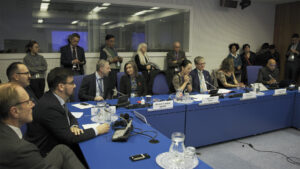A Macedonian harm reduction NGO, HOPS, assessed the access of injecting drug users and sex workers to justice. Please read a short summary of the findings of this research by Ivica Cekovski!
Access to justice derives from the universal principle of equality and is an essential mechanism in the system for providing and promoting human rights and the freedoms of all people. Yet, while citizens living on the social margins, including people who inject drugs (PWID), are frequently exposed to grave rights violations, it appears that they occupy a subordinate position in the attempts to exercise and protect their rights in front of courts, administrative bodies and other institutions, in comparison to the general population.
In order to be able to provide or better advocate for equal access to justice, one must first know the legal needs and the paths through which PWID are currently seeking protection of their rights. It is for that reason that HOPS undertook a nationwide endeavour to assess the legal needs and access to justice for PWID and sex workers in Macedonia. This article is an excerpt that paints the picture of the most frequent legal problems that PWID in Macedonia face, and the means through which they seek protection of their rights.
Watch this video produced by the Drugreporter video team in cooperation with HOPS Skopje!
The research showed that nearly all PWID (98.2%) have faced at least one legal problem in a recall period of about 3.5 years, which is double the proportion of people from the general population who report at least one legal problem (49%). Moreover, PWID in Macedonia face anywhere between 0 and 48 problems with potential legal remedy, or an average of 14.9 legal problems per person (CI95%=13.4-16.4), which is 10 times more than the frequency of legal problems among people from the general population, who report an average of 1.3-1.5 of such problems.
The following graph represents the average portion of PWID in Macedonia who report at least one justiciable problem in the noted areas.

As it can be observed, PWID in Macedonia commonly face labour relation problems, such as discrimination during attempts to find employment, as well as working without a contract and therefore without health and social insurance. Rights violations are frequent in prisons and include violence by custodial staff or other prisoners, denial of rights to submit petitions to the Ombudsman, and release from prison without proper documentation, which consequently obstructs the immediate continuation of their substitution treatment. Problems that PWID face with the police are also common and include unauthorised searches, profiling, physical or psychological abuse, and even unfounded detainment or deprivation from freedom.
This research established that younger PWID in Macedonia are more vulnerable to rights violations compared to their older counterparts, that PWID with Macedonian and Roma ethnicity face justiciable problems more frequently compared to Albanians and those with other ethnic backgrounds, and that PWID living outside the capital city report more legal problems than those living in Skopje.
Despite the high frequency of non-trivial justiciable problems and the awareness of the potential harms, when asked what they had done to resolve the legal problem that they considered to be the gravest, more than a quarter of PWID responded that they did absolutely nothing. An additional 18% had only made attempts to resolve the problem by themselves, without seeking advice or assistance from anyone.
In the cases where these citizens did ask for legal advice or aid towards resolution of their problems, most often they addressed legal practitioners or other individuals from Civil Society Organisations, and sought advice from lawyers whose services they paid for themselves, or through relatives and friends. They hardly ever used other institutionalised mechanisms for protection of their rights, for instance the Ombudsman, the Commission for Protection from Discrimination, the Police, the Sector for Internal Control at MOI, workers’ unions, and Social Work Centres, among others.

On the other end of the scale, the most common reasons for inactivity were that PWID have lost the belief that anyone could help them. In addition, many did not take any action because of the anticipated financial expenses which they could not afford, and, moreover, due to their lack of trust in the Macedonian justice system. Among the “Other” cited reasons for inactivity were fear of aggravating the problem, fear for their personal safety, feeling innocent regarding the charges, as well as self-victimisation (“I am an addict, and that’s what police do”).

With this research, we found that failure to act upon serious rights violations among PWID is more frequent for problems related to the police, with accessing health care, or problems encountered during sex work. We found no association between the explored demographic parameters (gender, age, ethnicity, place of residence, level of education, or personal income) and the respondents’ inactivity towards resolution of the gravest justiciable problems.
Further exploring the attitudes of PWID towards the justice system, we were able to establish that a vast majority of the community does not perceive the institutions in Macedonia to be just nor efficient in the enforcement and protection of rights and liberties. Most PWID believe that the legal system is biased against poor citizens and members of marginalised groups.

These findings strongly suggest the urgent need for increasing legal literacy among PWID, continuous investment in and promotion of the free legal aid offered by CSOs, sensitisation of employees in public institutions and of private employers, among other necessary interventions in laws, policies and practices.
The full analysis is available for download HERE.
Ivica Cekovski




